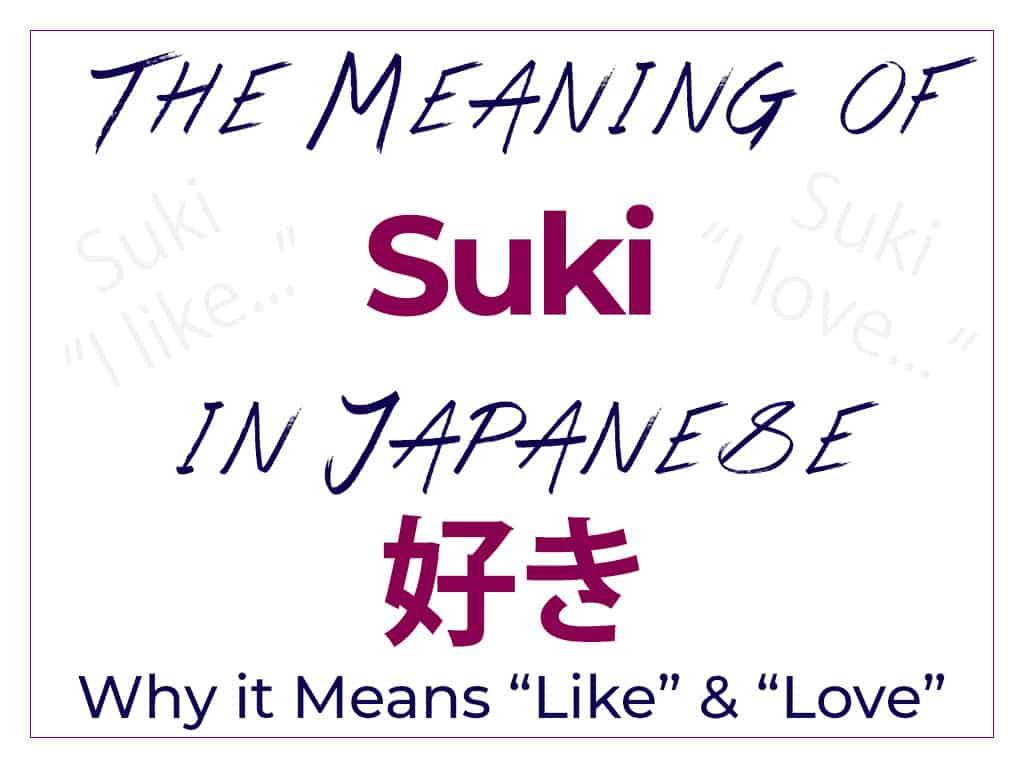When you first hear the word "suki," it might sound like a simple Japanese term, but trust me, there's so much more to it than meets the eye. Suki Japanese meaning isn't just about a word; it's a window into the rich culture and emotions of Japan. In Japanese, suki holds a special place in conversations, relationships, and even daily life. Whether you're a language enthusiast, a traveler, or just someone curious about Japanese culture, understanding suki is like unlocking a hidden treasure.
You might be wondering, "Why should I care about suki?" Well, my friend, suki isn't just any ordinary word. It's a powerful expression that can convey feelings of affection, fondness, and even love. Imagine being able to express your emotions in a way that resonates deeply with Japanese culture. That's the magic of suki. And guess what? By the end of this article, you'll not only know what suki means but also how to use it like a pro.
Before we dive deeper, let me give you a little teaser. Suki isn't just limited to romantic feelings. It can describe your love for food, music, or even a hobby. So, whether you're into anime, sushi, or karaoke, suki has something for everyone. Now that I've got your attention, let's explore the fascinating world of suki Japanese meaning together, shall we?
Read also:Unlocking The Mysteries Of Masa49cim A Comprehensive Guide
Understanding Suki: A Deep Dive Into Its Meaning
Let's start with the basics. What exactly does suki mean in Japanese? Simply put, suki translates to "like" or "love" in English. But here's the twist—it's much more nuanced than that. Suki is derived from the verb "suki da," which means "to like" or "to love." Depending on the context, suki can express anything from mild interest to deep affection. It's like a Swiss Army knife of emotions!
For instance, if you say "Sushi ga suki desu," it means "I like sushi." But if you say "Anata ga suki desu," it means "I like you" or "I have feelings for you." See how versatile it is? That's why understanding suki Japanese meaning is crucial if you want to communicate effectively in Japanese.
The Role of Suki in Japanese Conversations
Now that we know what suki means, let's talk about how it's used in everyday conversations. In Japan, expressing emotions can be a bit tricky. The culture values subtlety and indirectness, so words like suki are used carefully. For example, saying "Anata ga suki" to someone might feel a bit forward, especially if you're not in a close relationship. Instead, Japanese people often use phrases like "Kawaii desu ne" (It's cute, isn't it?) or "Oishii desu ne" (It's delicious, isn't it?) to express their feelings indirectly.
How to Use Suki Politely
Want to sound polite when using suki? Add the honorific "desu" or "masu" to make it more formal. For example:
- "Sushi ga suki desu" – I like sushi (polite form).
- "Anata ga suki desu" – I like you (polite form).
By using these polite forms, you show respect and consideration for the listener. It's a small gesture that goes a long way in Japanese culture.
Suki in Romantic Contexts
Let's talk about the romantic side of suki. If you're in a relationship with someone from Japan or just want to impress that special someone, knowing how to express your feelings using suki is essential. Saying "Anata ga suki" is a sweet and heartfelt way to tell someone you like them. However, if you want to take it up a notch, you can say "Aishiteru," which means "I love you." But be warned—Aishiteru is a much stronger declaration of love and should be used sparingly.
Read also:Unveiling Barron Trumps Height In 2025 An Insight Into His Growth
Tips for Using Suki in Romantic Situations
Here are a few tips to help you navigate the world of romantic suki:
- Use suki for casual or early-stage feelings.
- Save aishiteru for deeper, more committed relationships.
- Pay attention to the context and relationship dynamics.
Remember, communication in Japan is all about reading the atmosphere and respecting boundaries. So, take your time and let your feelings develop naturally.
Suki Beyond Romance: Expressing Love for Food, Hobbies, and More
While suki is often associated with romance, it's also a great way to express your love for other things. For example, if you're a foodie, you can say "Sushi ga suki" or "Ramen ga suki." If you're into anime, you can say "Anime ga suki." The possibilities are endless! By using suki in these contexts, you show genuine appreciation and passion for the things you love.
Popular Suki Phrases for Everyday Use
Here are some common suki phrases you can use in daily conversations:
- "Ocha ga suki desu" – I like tea.
- "Karaoke ga suki desu" – I like karaoke.
- "Nihon no bunka ga suki desu" – I like Japanese culture.
These phrases are not only useful but also a great conversation starter when chatting with Japanese friends or colleagues.
The Cultural Significance of Suki
Understanding suki Japanese meaning goes beyond just learning the word. It's about appreciating the cultural values that shape Japanese communication. In Japan, expressing emotions is a delicate art. Suki allows people to convey their feelings in a way that's both heartfelt and respectful. It's a reflection of the harmony and balance that Japanese culture values so highly.
How Suki Reflects Japanese Values
Suki embodies several key Japanese values, such as:
- Harmony (Wa): Suki promotes positive relationships and mutual understanding.
- Respect (Keigo): Using suki politely shows consideration for others.
- Honesty (Makoto): Suki encourages genuine and heartfelt communication.
By embracing these values, you'll not only improve your Japanese language skills but also gain a deeper appreciation for Japanese culture.
Common Misconceptions About Suki
Before we wrap up, let's address some common misconceptions about suki. Many people think that suki is only used in romantic contexts, but as we've seen, it's much more versatile than that. Another misconception is that suki is interchangeable with aishiteru. While both words express love, they have different levels of intensity and should be used accordingly.
Clearing the Air: Suki vs. Aishiteru
Here's a quick breakdown to help you understand the difference:
- Suki: Used for mild to moderate feelings of affection.
- Aishiteru: Used for deep, committed love.
Remember, context is key. Always consider the situation and your relationship with the listener before choosing your words.
Practical Tips for Mastering Suki
Now that you know all about suki Japanese meaning, here are some practical tips to help you master it:
- Practice using suki in different contexts to build confidence.
- Watch Japanese movies or TV shows to see how suki is used in real-life situations.
- Engage in conversations with native Japanese speakers to improve your skills.
The more you practice, the more natural it will feel to use suki in your daily life. So, don't be afraid to dive in and start expressing your feelings the Japanese way!
Conclusion: Embrace the Magic of Suki
In conclusion, suki Japanese meaning is much more than just a word—it's a gateway to understanding and appreciating Japanese culture. Whether you're expressing your love for someone special or sharing your passion for food and hobbies, suki allows you to connect with others on a deeper level. By mastering suki, you'll not only enhance your language skills but also enrich your relationships and experiences.
So, what are you waiting for? Start using suki today and let your feelings shine! And don't forget to share this article with your friends and family so they can join you on this fascinating journey. Together, let's explore the beauty of Japanese language and culture, one word at a time.
Table of Contents
- What Does Suki Mean in Japanese?
- Understanding Suki: A Deep Dive Into Its Meaning
- The Role of Suki in Japanese Conversations
- How to Use Suki Politely
- Suki in Romantic Contexts
- Tips for Using Suki in Romantic Situations
- Suki Beyond Romance: Expressing Love for Food, Hobbies, and More
- Popular Suki Phrases for Everyday Use
- The Cultural Significance of Suki
- How Suki Reflects Japanese Values
- Common Misconceptions About Suki
- Clearing the Air: Suki vs. Aishiteru
- Practical Tips for Mastering Suki
- Conclusion: Embrace the Magic of Suki


